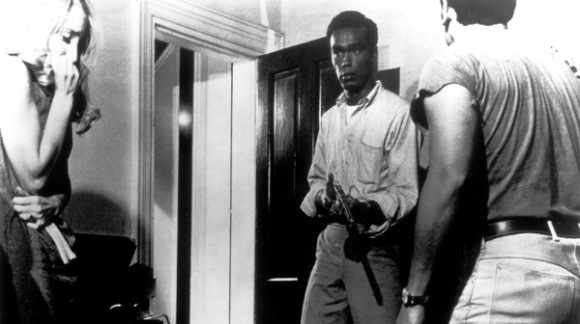
It’s often through horror that we are allowed to process and reclaim taboo or traumatic subjects, and it’s precisely for that reason that war, genocide, and violent oppression seem tailor made for the horror film treatment. If you’re interested in how institutionalized (and often racialized) violence plays out in genre films, you’ve come to the right place:
Jacob’s Ladder
Adrian Lyne, 1990
The story: During the Vietnam war, Jacob’s unit is attacked, and the soldiers not killed start exhibiting abnormal behaviour. Four years later, Jacob is estranged from his wife and children, working a dead-end job, and dealing with terrifying hallucinations. He is contacted by an old comrade who is experiencing the same visions, and Jacob learns they’re not the only ones still haunted. Information is being kept from them, and now they must fight to survive long enough to uncover the truth.
Why you should watch it: If medical abuse is particularly terrifying to you, I would suggest staying away from this one (or watching it immediately, as the case may be). Jacob’s Ladder is a compelling treatment of PTSD and the difficulty of reintegrating yourself into regular life after military experience. If you’re into the total disintegration of pat wartime narratives of good and bad guys, with some body horror thrown in for good measure, this is a pretty solid choice.

Night of the Living Dead
George A. Romero, 1968
The story: All along the eastern US, the recently dead have become reanimated, and are terrorizing the living. In rural Pennsylvania a group of scared survivors all find shelter in a farmhouse. Among them is Ben, the sole black man among a group that is in turns hostile or in shock. As the night progresses Ben seems to be the only one with tangible plans for survival. Come morning, impromptu militias scour the country side looking for survivors, but this isn’t the end of the danger.
Why you should watch it: An immediate, though controversial, success upon release, Night of the Living Dead was hugely influential for zombie movies, and horror more generally. It’s thought to be commentary on the loss of lives—in particular those of black men—during the Vietnam war, and Duane Jones’s Ben shine as the one the voice of reason among the panic. The injustice of Ben’s fate after having struggled to survive remains shockingly relevant to this day; despite its status as a classic, the film still feels entirely subversive.

Rhymes for Young Ghouls
Jeff Barnaby, 2013
The story: Aila, a teenager living in a fictional Mi’gmaq reserve in 1976, inherits her father’s drug dealing business, using the profits to pay off Popper, the local Indian agent, and keep herself out of the residential school system. Her father’s reappearance upsets Aila’s business arrangements, and she must use all of her resourcefulness to escape the residential school, keep herself safe, and exact revenge on the abusive Popper.
Why you should watch it: Rhymes for Young Ghouls won a bunch of Canadian film awards when it came out three years ago, and for good reason. It’s a tightly woven, immediately intense story that uses supernatural horror imagery to augment the very real horrors of abuse, neglect, and cultural genocide. Rather than act as the central focus, the film’s magic realism serves a larger conversation on the lasting impacts of the residential school system, a conversation we’re only beginning to have as a country.

